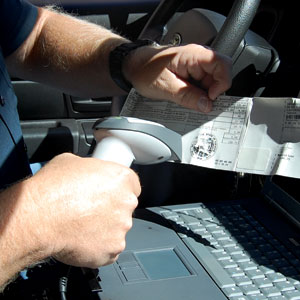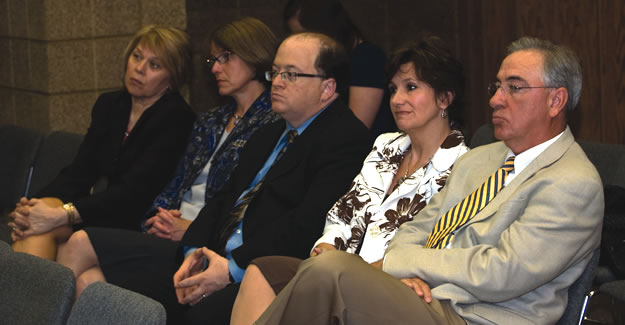Reaching the 100 mark is momentous for birthdays and businesses. Celebrations fitting for the occasion usually include parties and cakes along with speeches and pictures. On June 8th, an unlikely guest of honor, traffic tickets, celebrated the triple digit number. Getting a traffic ticket can lead a person to proclaim, “It was a bad day.” But the paperless ticket celebrated in LaPorte is likely to win over even the most skeptical. Touted for its ability to save time and money and promote safety for citizens and police—the e-Ticket is reason to celebrate.
 The system allows law enforcement officers to use hand-held devices to scan the bar codes on drivers’ licenses and registrations and instantly create traffic tickets. The e-Tickets (and any warning tickets) are sent to the Bureau of Motor Vehicles (BMV) and become available to any other officer who accesses the BMV records. The law enforcement agency and local prosecutor “own” the information until they make the decision if and when to file a ticket with a court. The program is officially known as the electronic Citation and Warning System, or eCWS. It was developed in 2007 by the Indiana Supreme Court under the guidance of the Court’s Judicial Technology and Automation Committee (JTAC) to facilitate the filing of traffic cases in the state’s case management system, Odyssey. Supreme Court Justice Frank Sullivan, Jr. who chairs JTAC, traveled to northern Indiana to welcome the LaPorte County Sheriff’s Office as the 100th law enforcement agency to begin using the system.
The system allows law enforcement officers to use hand-held devices to scan the bar codes on drivers’ licenses and registrations and instantly create traffic tickets. The e-Tickets (and any warning tickets) are sent to the Bureau of Motor Vehicles (BMV) and become available to any other officer who accesses the BMV records. The law enforcement agency and local prosecutor “own” the information until they make the decision if and when to file a ticket with a court. The program is officially known as the electronic Citation and Warning System, or eCWS. It was developed in 2007 by the Indiana Supreme Court under the guidance of the Court’s Judicial Technology and Automation Committee (JTAC) to facilitate the filing of traffic cases in the state’s case management system, Odyssey. Supreme Court Justice Frank Sullivan, Jr. who chairs JTAC, traveled to northern Indiana to welcome the LaPorte County Sheriff’s Office as the 100th law enforcement agency to begin using the system.
To celebrate the milestone, Justice Sullivan joined members of the press, public, courts, and law enforcement to congratulate the LaPorte County Sheriff’s Office. He even pulled out his own driver’s license to show the media how the system works. He scanned his license to create a “mock” ticket. As Justice Sullivan’s driver information appeared for all to see, he joked that the weight was correct within 10 pounds. The conversation turned more serious as he asked police to talk about the safety element inherent in the e-Ticket system.
“The most dangerous time for officers on a traffic stop is when they’re pulled over and stopped on the side of the road,” said Indiana State Police 1st Sergeant Larry Jenkins. As a strong supporter of the e-Ticket system, the State Police has the distinction of being the first agency to use eCWS. Sergeant Jenkins described the importance of getting an officer and a driver off the side of the road more quickly by saying: “those few minutes could be the difference between life and death.”
The Supreme Court is proud to have developed a program that places a premium on safety, Justice Sullivan explained, “Because the scanning equipment operates so much faster than writing the ticket by hand, the law enforcement officer spends a half to a third as much time on the side of the road.” Officer Jenkins agreed and noted the “mock” ticket created for Justice Sullivan was done in just a few minutes. “I think that’s probably the most important feature in the officers’ eyes and my eyes – to be able to expedite things out there on the road,” said LaPorte County Sheriff Michael Mollenhauer “and be able to take care of business, so-to-speak, a lot quicker and a lot safer.”
The 21st-century technology makes patrolling safer for officers and drivers and it allows for more cost-effective ticketing. eCWS allows traffic tickets to be uploaded to a web-based system where cases can automatically be filed with the Indiana Supreme Court’s statewide case management system called Odyssey and the Bureau of Motor Vehicles (BMV). This eliminates data errors and saves countless dollars on administrative time, paper filing and tracking. “No longer does the county have to invest in books and books and books of traffic tickets, nor in the personnel necessary to re-enter the information written out in hand into computer systems,” explained Justice Sullivan.
For Sheriff Mollenhauer the safety aspect trumped all others when talking about e-Ticket, but a close second is the cost. “We are also fortunate the system was provided to us without any cost to local law enforcement or local taxpayers,” he explained. E-Ticket software and training are provided to law enforcement agencies at JTAC’s cost. It was developed with state and federal grant dollars. The Indiana Supreme Court works in partnership with the Indiana State Police, Indiana Criminal Justice Institute and law enforcement officials including the Indiana Association of Chiefs of Police, the Indiana Sheriffs’ Association, and local departments across the state.

“I’m impressed with the Court’s use of leading edge technology to make our system more efficient, while at the same time saving taxpayer dollars,” explained LaPorte Superior Court Judge Kathleen Lang. She and other LaPorte County judges showed their support for the system by attending the hands-on demonstration. There are approximately 18,000 new traffic violations filed in LaPorte County each year. Magistrate Greta Friedman handles approximately 7,000- 8,000 of them in her court and explained, “I think it will be a huge improvement for the officers out there on the front lines as they track down all necessary information for traffic stops. It will certainly be helpful in my misdemeanor court hearings. It speaks volumes to me that 99 other law enforcement agencies have signed on and are finding success with it. I know this will be a useful tool for all involved in the legal system.”
LaPorte Magistrate Nancy Gettinger was also impressed with the system and added her observations: “I had seen the system demonstrated at the Judicial Conference in Fort Wayne a couple of years ago. I am glad that our county is coming on board. It is a good thing any time we can make the court’s work more efficient and assist in protecting our police officers. Because the Indiana Toll Road passes through our county we are very sensitive to safety issues for State Police officers making traffic stops on heavily traveled roads.”
One hundred marks the number of law enforcement agencies across the state now using the system and one million marks the number of warnings and tickets that have been created using e-Ticket. But the most important number to celebrate may be three—the three “hallmarks” of e-Ticket according to Justice Sullivan are “accuracy, savings, and safety.” More information can be found online at courts.in.gov/jtac/programs/ecws.html.